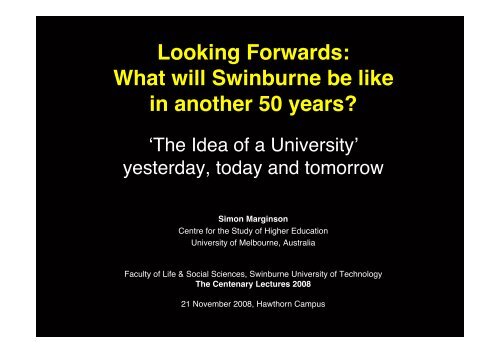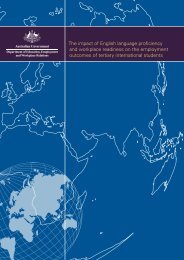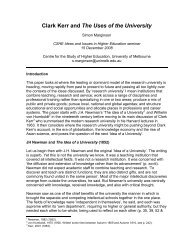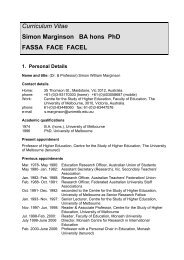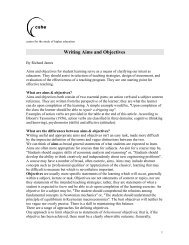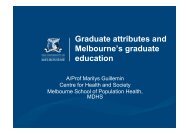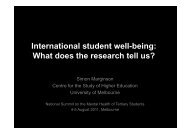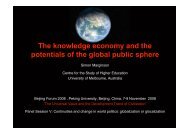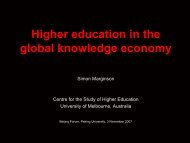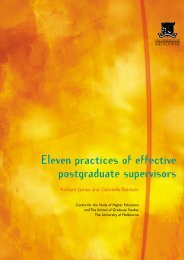Swinburne Lecture 21 November 2008 - Centre for the Study of ...
Swinburne Lecture 21 November 2008 - Centre for the Study of ...
Swinburne Lecture 21 November 2008 - Centre for the Study of ...
Create successful ePaper yourself
Turn your PDF publications into a flip-book with our unique Google optimized e-Paper software.
Looking Forwards:<br />
What will <strong>Swinburne</strong> be like<br />
in ano<strong>the</strong>r 50 years<br />
ʻThe Idea <strong>of</strong> a Universityʼ<br />
yesterday, today and tomorrow<br />
Simon Marginson<br />
<strong>Centre</strong> <strong>for</strong> <strong>the</strong> <strong>Study</strong> <strong>of</strong> Higher Education<br />
University <strong>of</strong> Melbourne, Australia<br />
Faculty <strong>of</strong> Life & Social Sciences, <strong>Swinburne</strong> University <strong>of</strong> Technology<br />
The Centenary <strong>Lecture</strong>s <strong>2008</strong><br />
<strong>21</strong> <strong>November</strong> <strong>2008</strong>, Hawthorn Campus
Newman was <strong>the</strong> founding rector <strong>of</strong><br />
University College, Dublin, Ireland
ʻ … here are two methods <strong>of</strong> Education; <strong>the</strong> end <strong>of</strong> <strong>the</strong> one is to be philosophical, <strong>of</strong> <strong>the</strong> o<strong>the</strong>r to be<br />
mechanical; <strong>the</strong> one rises towards general ideas, <strong>the</strong> o<strong>the</strong>r is exhausted upon what is particular and<br />
external. Let me not be thought to deny <strong>the</strong> necessity, or to decry <strong>the</strong> benefit, <strong>of</strong> such attention to<br />
what is particular and practical, as belongs to <strong>the</strong> useful or mechanical arts; life could not go on<br />
without <strong>the</strong>m; we owe our daily welfare to <strong>the</strong>m; <strong>the</strong>ir exercise is <strong>the</strong> duty <strong>of</strong> <strong>the</strong> many, and we owe<br />
to <strong>the</strong> many a debt <strong>of</strong> gratitude <strong>for</strong> fulfiulling that duty. I only say that Knowledge, in proportion as it<br />
tends more and more to be particular, ceases to be knowledgeʼ.<br />
~ JH Newman, The Idea <strong>of</strong> a University, 1852 (1982), p. 85
Clark Kerr was President <strong>of</strong> <strong>the</strong><br />
University <strong>of</strong> Cali<strong>for</strong>nia system
ʻThe basic reality, <strong>for</strong> <strong>the</strong> university, is <strong>the</strong> widespread recognition that new<br />
knowledge is <strong>the</strong> most important factor in economic and social growth. We are just<br />
now perceiving that <strong>the</strong> universityʼs invisible product, knowledge, may be <strong>the</strong> most<br />
powerful single element in our culture, affecting <strong>the</strong> rise and fall <strong>of</strong> pr<strong>of</strong>essions and<br />
even <strong>of</strong> social classes, <strong>of</strong> regions and even <strong>of</strong> nationsʼ.<br />
~ Clark Kerr, The Uses <strong>of</strong> <strong>the</strong> University, 1962 (2001), p. xii
ʻThe “Idea <strong>of</strong> a University” was a village with its priests. The “Idea <strong>of</strong> a Modern University”<br />
was a town – a one-industry town – with its intellectual oligarchy. “The Idea <strong>of</strong> a<br />
Multiversity” is a city <strong>of</strong> infinite variety. Some get lost in <strong>the</strong> city; some rise to <strong>the</strong> top within<br />
it; most fashion <strong>the</strong>ir lives within one <strong>of</strong> its many subcultures. There is less <strong>of</strong> a sense <strong>of</strong><br />
community than in <strong>the</strong> village but also less sense <strong>of</strong> confinement. There is less sense <strong>of</strong><br />
purpose than within <strong>the</strong> town but <strong>the</strong>re are more ways to excelʼ.<br />
~ Clark Kerr, The Uses <strong>of</strong> <strong>the</strong> University, 1962 (2001), p. 31
Stan<strong>for</strong>d<br />
University<br />
University <strong>of</strong> Cali<strong>for</strong>nia,<br />
Berkeley<br />
Students at <strong>the</strong> Kennedy School,<br />
Harvard University
The Global Research University (GRU)
Shanghai Jiao Tong University global<br />
university research rankings: weightings<br />
criterion<br />
weighting<br />
Alumni <strong>of</strong> institution: Nobel Prizes and field medals<br />
Staff <strong>of</strong> institution: Nobel Prizes and field medals<br />
High citation (HiCi) researchers<br />
Articles in Nature and Science<br />
Articles in science and social science citation indexes<br />
Research per<strong>for</strong>mance (as above) per head <strong>of</strong> staff<br />
10%<br />
20%<br />
20%<br />
20%<br />
20%<br />
10%<br />
total<br />
100%
Times Higher global university<br />
rankings: weightings<br />
criterion<br />
ʻPeer reviewʼ (survey)<br />
ʻGlobal employerʼ review (survey)<br />
Internationalization <strong>of</strong> academic staff (proportion)<br />
Internationalization <strong>of</strong> student body (proportion)<br />
Student-academic staff ratio<br />
Research citations per head <strong>of</strong> academic staff<br />
weighting<br />
40%<br />
10%<br />
5%<br />
5%<br />
20%<br />
20%<br />
total<br />
100%
Pr<strong>of</strong>ile <strong>of</strong> <strong>the</strong> Global Research University<br />
TWO ‘INNER’ PRODUCTIVE FUNCTIONS<br />
1. Production and dissemination <strong>of</strong> research and knowledge<br />
2. Formation <strong>of</strong> students as self-<strong>for</strong>ming individuals<br />
THAT ARE THE FOUNDATION OF THREE FUNCTIONS IN THE LARGER RELATIONAL SETTING<br />
3. Contributions to modernization and development<br />
4. Global public goods (collective benefits <strong>of</strong> higher education)<br />
5. Regulation <strong>of</strong> educational and social opportunity
World top 100 research universities <strong>2008</strong><br />
Shanghai Jiao Tong University Institute <strong>of</strong> Higher Education<br />
Australia<br />
3%<br />
Switzerland<br />
3%<br />
France<br />
3%<br />
Sweden<br />
4%<br />
Canada<br />
4%<br />
Japan<br />
4%<br />
Ne<strong>the</strong>rlands<br />
2%<br />
Denmark<br />
2%<br />
o<strong>the</strong>rs<br />
4%<br />
USA<br />
54%<br />
O<strong>the</strong>rs (one each):<br />
Israel, Norway,<br />
Finland, Russia<br />
Germany<br />
6%<br />
UK<br />
11%
Annual rate <strong>of</strong> growth <strong>of</strong> scientific<br />
publications, 1995-2005<br />
United States National Science Bureau data, <strong>2008</strong><br />
18.0<br />
16.0<br />
16.5<br />
15.7<br />
14.0<br />
12.0<br />
13.9<br />
12.2<br />
10.0<br />
8.6<br />
8.0<br />
6.0<br />
5.3<br />
4.5<br />
4.0<br />
2.0<br />
0.0<br />
2.3<br />
2.0 1.8 1.7<br />
0.6<br />
0.0<br />
China<br />
South Korea<br />
Taiwan China<br />
Singapore<br />
Thailand<br />
Malaysia<br />
India<br />
world average<br />
Australia<br />
European Union<br />
Japan<br />
USA<br />
UK
Shares <strong>of</strong> world output:<br />
1978<br />
o<strong>the</strong>r<br />
29.4%<br />
China<br />
4.9% India<br />
3.3%<br />
Japan<br />
7.6%<br />
Western Europe<br />
24.2%<br />
Russia<br />
9.0%<br />
USA<br />
<strong>21</strong>.6%
Shares <strong>of</strong> world output:<br />
2030<br />
o<strong>the</strong>r<br />
29.2%<br />
China<br />
23.1%<br />
Russia<br />
3.4%<br />
India<br />
10.4%<br />
Japan<br />
3.6%<br />
USA<br />
17.3%<br />
Western Europe<br />
13.0%
Languages with 100 million<br />
speakers or more<br />
1200<br />
1000<br />
800<br />
600<br />
400<br />
200<br />
0<br />
English<br />
Putonghua (Mandarin)<br />
Hindi/ Urdu<br />
Spanish<br />
Russian<br />
Arabic<br />
Bangla<br />
Portuguese<br />
Malay/ Indonesian<br />
Japanese<br />
French<br />
German
http://www.cshe.unimelb.edu.au/people/staff_pages/Marginson/Marginson.html<br />
Published by<br />
Peter Lang, New<br />
York, early 2009<br />
Published by Peter<br />
Lang, New York, late<br />
2009


